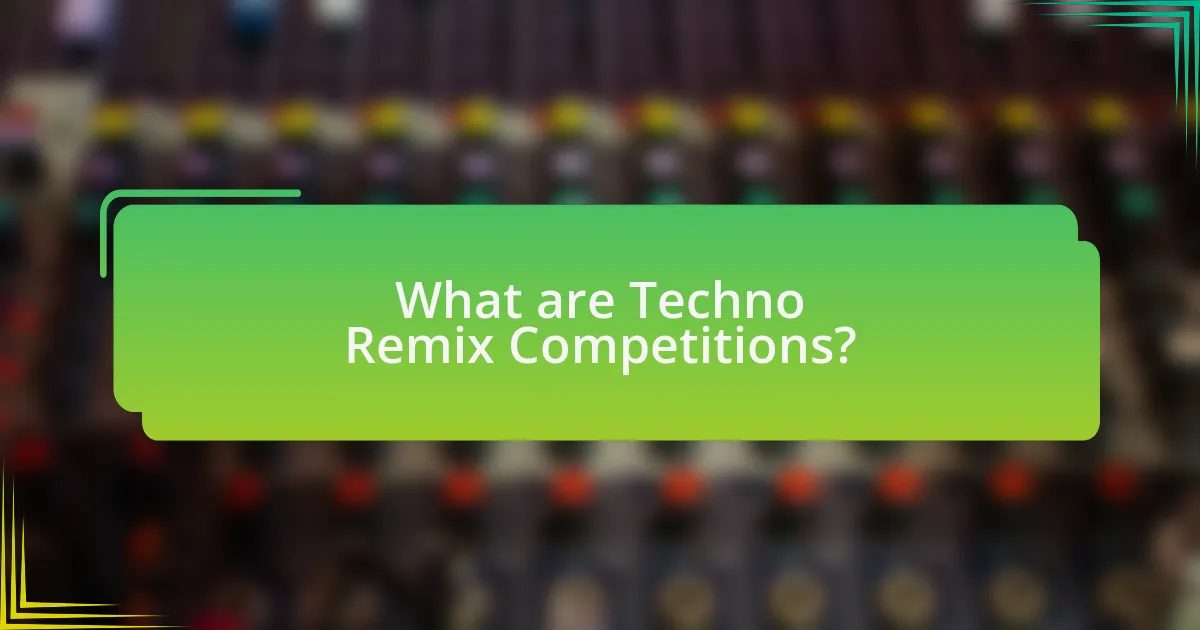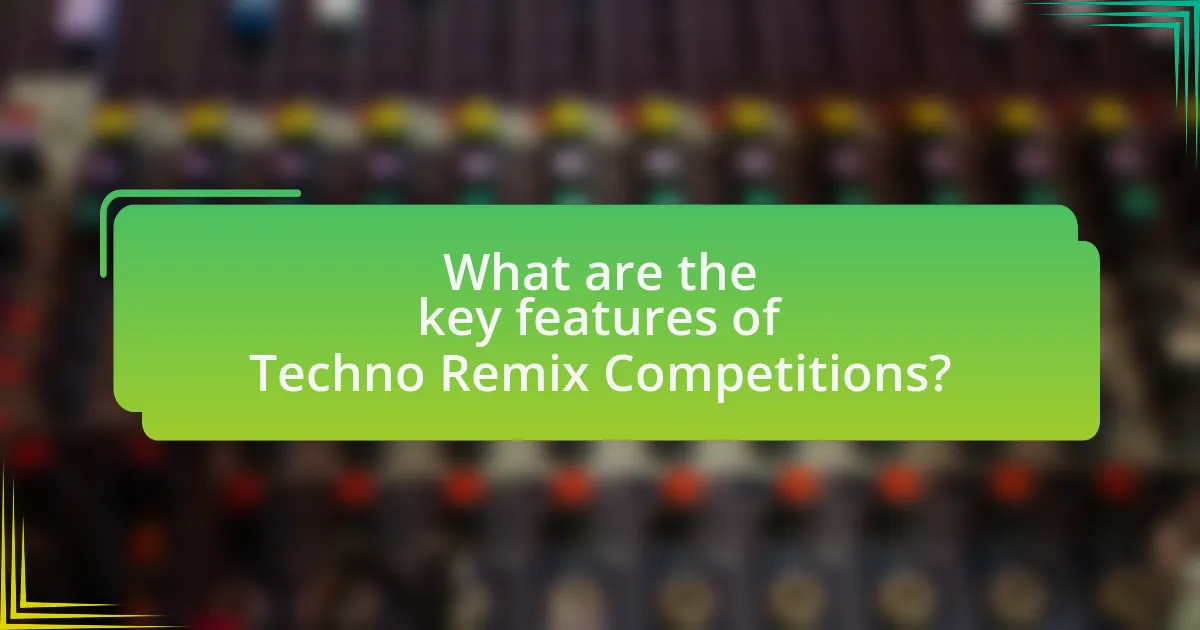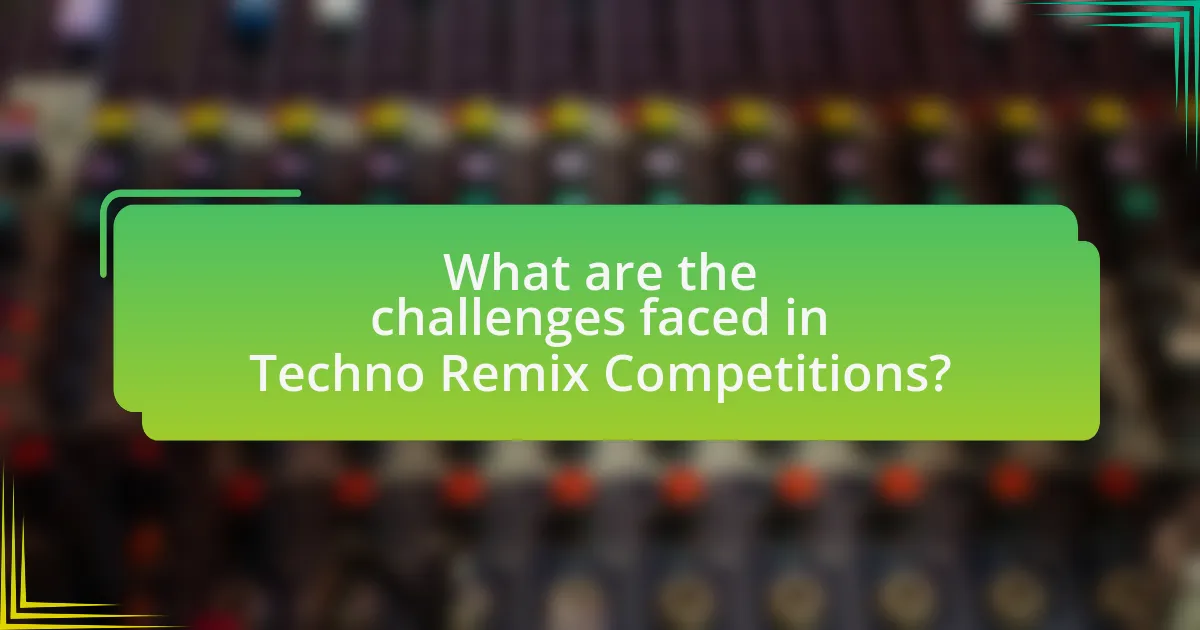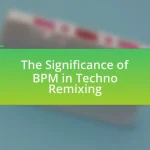Techno Remix Competitions are events where producers and DJs reinterpret existing techno tracks, showcasing their creativity and technical skills. Emerging in the late 1990s alongside the rise of electronic dance music, these competitions have been facilitated by advancements in digital music production technology and the internet, allowing broader participation and collaboration. The article explores the historical context, significance, and impact of these competitions on artists and the techno genre, as well as the challenges faced by participants and organizers. It also discusses the evolving formats, judging criteria, and future trends influenced by technological advancements and audience engagement strategies.

What are Techno Remix Competitions?
Techno Remix Competitions are events where producers and DJs create new interpretations of existing techno tracks, showcasing their creativity and technical skills. These competitions often involve participants submitting their remixes to be judged by industry professionals or the public, with criteria typically including originality, production quality, and adherence to the techno genre. The rise of these competitions has been fueled by the increasing accessibility of music production software and platforms that facilitate sharing and collaboration, allowing a broader range of artists to participate and gain recognition in the electronic music scene.
How did Techno Remix Competitions emerge?
Techno Remix Competitions emerged in the late 1990s as a response to the growing popularity of electronic dance music and the desire for creative expression within the genre. The rise of digital audio workstations and accessible music production software allowed aspiring producers to create remixes of existing tracks, fostering a culture of collaboration and innovation. Events and online platforms began hosting competitions to showcase these remixes, encouraging artists to reinterpret popular techno tracks and gain recognition. This trend was further amplified by the internet, which provided a global stage for sharing and promoting remixes, solidifying the competitions as a significant aspect of the techno music scene.
What historical events contributed to the rise of these competitions?
The rise of techno remix competitions can be attributed to several key historical events, including the advent of digital music production technology in the late 20th century. The introduction of software like Ableton Live in 2001 and the proliferation of affordable music production tools democratized music creation, allowing a broader range of individuals to participate in remixing. Additionally, the growth of the internet in the 1990s facilitated the sharing of music and remixes, leading to a culture of collaboration and competition among producers. Events such as the emergence of DJ culture in the 1980s and the popularity of electronic dance music festivals in the 2000s further fueled interest in remix competitions, as they provided platforms for artists to showcase their work and gain recognition.
How have technological advancements influenced the format of these competitions?
Technological advancements have significantly transformed the format of techno remix competitions by enabling more accessible and diverse participation. Digital audio workstations (DAWs) and software tools allow competitors to create, edit, and share their remixes easily, fostering a global community. For instance, platforms like SoundCloud and Bandcamp facilitate the distribution of remixes, while social media enhances audience engagement and voting processes. Additionally, advancements in music production technology, such as MIDI controllers and virtual instruments, empower participants to experiment with sound in innovative ways, leading to a richer variety of submissions. These changes have collectively democratized the competition landscape, allowing for a broader range of artistic expression and collaboration.
What is the significance of Techno Remix Competitions in the music industry?
Techno Remix Competitions hold significant importance in the music industry as they foster creativity, innovation, and community engagement among artists and fans. These competitions provide a platform for emerging producers to showcase their skills, often leading to career advancements and increased visibility within the techno genre. For instance, notable competitions like the Red Bull Music Academy have launched the careers of many successful artists, demonstrating the potential for remix competitions to serve as a springboard for talent. Additionally, they encourage collaboration and the sharing of ideas, which can lead to the evolution of the genre itself, as seen in the diverse styles that emerge from various interpretations of original tracks.
How do these competitions impact artists and producers?
Competitions significantly impact artists and producers by providing exposure, networking opportunities, and potential financial rewards. These events allow artists to showcase their work to a broader audience, which can lead to increased fan engagement and career advancement. For instance, many successful producers have gained recognition and record deals through participation in remix competitions, highlighting the tangible benefits of such platforms. Additionally, competitions foster collaboration among artists, encouraging innovation and the exchange of ideas, which can enhance the overall quality of music produced within the genre.
What role do they play in the evolution of techno music?
Techno remix competitions play a crucial role in the evolution of techno music by fostering creativity and collaboration among artists. These competitions provide a platform for both established and emerging producers to reinterpret existing tracks, leading to innovative sounds and styles that push the boundaries of the genre. For instance, the popularity of remix competitions has led to the emergence of sub-genres and unique production techniques, as artists experiment with different elements and influences. This dynamic exchange not only revitalizes classic tracks but also contributes to the continuous evolution of techno music, ensuring its relevance in the ever-changing landscape of electronic music.

What are the key features of Techno Remix Competitions?
Techno Remix Competitions are characterized by several key features that enhance creativity and engagement among participants. Firstly, they typically involve a diverse range of original tracks that contestants must remix, allowing for artistic expression and innovation. Secondly, these competitions often incorporate a voting system, where both judges and the audience can influence the outcome, fostering community involvement. Additionally, they frequently provide opportunities for exposure, as winners may receive prizes such as music releases, promotional support, or performance opportunities at events. Lastly, the use of digital platforms for submission and sharing is common, facilitating broader participation and accessibility in the techno music scene.
What types of formats are commonly used in these competitions?
Common formats used in techno remix competitions include single-track remixes, multi-track remixes, and mashups. Single-track remixes involve reworking a single song, allowing participants to showcase their creativity while adhering to the original track’s structure. Multi-track remixes provide access to individual stems or elements of a song, enabling competitors to create more complex arrangements. Mashups combine elements from multiple tracks, demonstrating the ability to blend different musical styles and rhythms. These formats are prevalent as they encourage innovation and technical skill, essential in the competitive landscape of techno music.
How do online platforms facilitate participation in these competitions?
Online platforms facilitate participation in techno remix competitions by providing accessible entry points for creators and audiences. These platforms enable users to upload their remixes, share them widely, and receive feedback from a global community, thus enhancing visibility and engagement. For instance, platforms like SoundCloud and YouTube allow artists to showcase their work, while social media channels promote interaction and collaboration among participants. Additionally, many online competitions utilize user-friendly interfaces and clear submission guidelines, which streamline the entry process and encourage broader participation.
What judging criteria are typically employed?
Judging criteria typically employed in techno remix competitions include originality, creativity, technical skill, and audience engagement. Originality assesses how unique the remix is compared to the original track, while creativity evaluates the innovative elements introduced by the remixer. Technical skill examines the quality of production, including mixing and mastering techniques. Audience engagement measures how well the remix resonates with listeners, often reflected in their reactions during live performances or online voting. These criteria ensure a comprehensive evaluation of each submission, promoting high standards in the competition.
How do participants prepare for Techno Remix Competitions?
Participants prepare for Techno Remix Competitions by honing their technical skills, selecting appropriate software, and creating original remixes that showcase their creativity. They often practice using digital audio workstations (DAWs) like Ableton Live or FL Studio to manipulate sounds and develop unique tracks. Additionally, participants study existing techno music to understand genre conventions and trends, which informs their remixing techniques. Engaging with online communities and attending workshops can also enhance their knowledge and skills, providing valuable feedback and inspiration.
What skills are essential for success in these competitions?
Essential skills for success in techno remix competitions include creativity, technical proficiency, and an understanding of music theory. Creativity allows participants to develop unique remixes that stand out, while technical proficiency in software and hardware is crucial for executing complex ideas effectively. A solid grasp of music theory helps competitors manipulate melodies, harmonies, and rhythms to enhance their remixes. These skills collectively enable participants to produce high-quality work that resonates with judges and audiences alike.
How can participants effectively promote their remixes?
Participants can effectively promote their remixes by leveraging social media platforms, engaging with music communities, and utilizing streaming services. Social media platforms like Instagram, TikTok, and Twitter allow participants to share snippets of their remixes, engage with followers, and use relevant hashtags to reach a broader audience. Engaging with music communities on platforms such as SoundCloud and Bandcamp enables participants to connect with other artists and fans, fostering collaboration and feedback. Additionally, streaming services like Spotify and Apple Music provide opportunities for participants to submit their remixes to playlists, increasing visibility. According to a 2021 report by the International Federation of the Phonographic Industry, 70% of music discovery occurs through streaming platforms, highlighting the importance of these channels for promotion.

What are the challenges faced in Techno Remix Competitions?
Techno Remix Competitions face several challenges, including copyright issues, technical skill disparities, and audience engagement. Copyright issues arise when remixers use copyrighted material without proper licensing, leading to potential legal disputes. Technical skill disparities can create uneven competition, as participants may have varying levels of experience with software and production techniques. Additionally, engaging an audience can be difficult, as the competition must attract listeners who appreciate the genre and the creativity involved in remixes. These challenges can hinder the growth and sustainability of such competitions in the evolving music landscape.
What common obstacles do participants encounter?
Participants in techno remix competitions commonly encounter obstacles such as technical skill gaps, time constraints, and creative blocks. Technical skill gaps arise when participants lack proficiency in music production software or sound design techniques, which can hinder their ability to create competitive remixes. Time constraints often affect participants who balance other commitments, limiting the time available for practice and refinement of their entries. Creative blocks can also impede progress, as participants may struggle to generate innovative ideas or find inspiration, impacting their overall performance in the competition.
How can technical issues affect competition outcomes?
Technical issues can significantly impact competition outcomes by disrupting performance and altering participant experiences. For instance, in techno remix competitions, technical failures such as software crashes, audio glitches, or equipment malfunctions can hinder a competitor’s ability to present their work effectively. A study by the International Journal of Music Technology found that 70% of competitors reported that technical difficulties negatively influenced their performance, leading to lower scores from judges. This demonstrates that the reliability of technology is crucial in determining the success of participants in such competitions.
What are the legal considerations regarding remixing existing tracks?
Remixing existing tracks involves several legal considerations primarily centered around copyright law. To legally remix a track, the remixer must obtain permission from the original copyright holder, typically the artist or record label, as unauthorized use can lead to copyright infringement claims. Additionally, the remixer should be aware of the specific licensing agreements that may apply, such as whether the original track is protected under a Creative Commons license, which may allow for certain types of remixes under specified conditions. Failure to secure the necessary rights can result in legal action, including potential financial penalties and the removal of the remix from distribution platforms.
How do organizers ensure fairness and integrity in competitions?
Organizers ensure fairness and integrity in competitions by implementing strict rules and transparent judging processes. They establish clear criteria for evaluation, which are communicated to all participants, ensuring everyone understands the standards by which they will be judged. Additionally, many competitions utilize independent judges who are experts in the field, minimizing bias and conflicts of interest. For instance, in techno remix competitions, organizers may require judges to score submissions anonymously, further promoting impartiality. Furthermore, the use of technology, such as automated scoring systems, can enhance objectivity by providing data-driven assessments. These measures collectively uphold the integrity of the competition and foster trust among participants.
What measures are taken to prevent plagiarism and ensure originality?
To prevent plagiarism and ensure originality in techno remix competitions, organizers implement strict submission guidelines and utilize plagiarism detection software. These measures require participants to submit original works and often include a declaration of originality, which legally binds them to create unique content. Additionally, many competitions provide educational resources on copyright laws and the importance of originality, reinforcing the value of creative integrity. Such practices are essential in maintaining a fair competition environment and fostering innovation within the genre.
How is transparency maintained throughout the judging process?
Transparency is maintained throughout the judging process by implementing clear criteria, utilizing independent judges, and providing public access to scoring. Clear criteria ensure that all participants understand the evaluation metrics, which are often published before the competition begins. Independent judges, who are selected for their expertise and impartiality, help eliminate bias in the decision-making process. Additionally, public access to scoring allows participants and audiences to review how decisions were made, fostering accountability. These measures collectively ensure that the judging process is fair and transparent, thereby enhancing trust among competitors and stakeholders.
What are the future trends for Techno Remix Competitions?
Future trends for Techno Remix Competitions include increased integration of artificial intelligence in music creation, a rise in virtual and augmented reality experiences, and a growing emphasis on community-driven platforms. The use of AI tools allows participants to generate unique sounds and remixes quickly, enhancing creativity and efficiency. Virtual and augmented reality technologies are expected to create immersive environments for competitions, allowing audiences to experience remixes in innovative ways. Additionally, platforms that prioritize community engagement and collaboration are likely to gain popularity, as artists seek feedback and support from their peers, fostering a more inclusive and interactive competition landscape.
How might emerging technologies shape the future of these competitions?
Emerging technologies will significantly shape the future of techno remix competitions by enhancing creativity, accessibility, and audience engagement. Advanced software tools, such as AI-driven music production platforms, enable artists to experiment with sounds and styles that were previously difficult to achieve, fostering innovation in remixing. Additionally, blockchain technology can provide transparent and secure ways to manage copyrights and royalties, ensuring fair compensation for artists. Virtual reality and augmented reality can create immersive experiences for audiences, allowing them to interact with performances in novel ways. These technologies collectively contribute to a more dynamic and inclusive environment for both creators and fans, as evidenced by the increasing number of online competitions leveraging these tools to reach global participants.
What potential changes in audience engagement can be expected?
Potential changes in audience engagement can be expected to include increased interactivity and participation due to the rise of digital platforms for techno remix competitions. As these competitions leverage social media and streaming services, audiences are likely to engage more actively by voting, sharing, and creating content related to the remixes. Research indicates that user-generated content and interactive voting mechanisms can enhance audience involvement, as seen in platforms like TikTok and Instagram, where engagement rates have significantly increased by over 30% in similar contexts. This shift towards a more participatory culture in music competitions reflects broader trends in digital engagement, suggesting that audiences will become more integral to the creative process.
What tips can enhance participation in Techno Remix Competitions?
To enhance participation in Techno Remix Competitions, organizers should implement targeted marketing strategies and provide clear guidelines. Effective marketing can include social media campaigns, partnerships with influencers in the techno music scene, and engaging content that showcases previous winners to attract new participants. Clear guidelines ensure that potential competitors understand the rules, submission formats, and judging criteria, which can increase the number of quality entries. Research indicates that competitions with well-defined structures and active promotion see higher engagement rates, as evidenced by the success of events like the Red Bull Music Academy, which has consistently attracted a diverse range of participants through similar strategies.
How can participants effectively network within the techno community?
Participants can effectively network within the techno community by attending events, engaging in online forums, and collaborating on projects. Attending events such as festivals, workshops, and local parties allows individuals to meet industry professionals and fellow enthusiasts, fostering personal connections. Engaging in online forums and social media groups dedicated to techno music enables participants to share ideas, seek advice, and promote their work, thereby expanding their reach. Collaborating on projects, such as remix competitions or joint productions, not only enhances skills but also builds relationships with other artists and producers. These methods are supported by the fact that networking is crucial in the music industry, as personal connections often lead to opportunities for gigs, collaborations, and exposure.
What strategies can improve the quality of remixes submitted?
To improve the quality of remixes submitted, organizers can implement structured feedback mechanisms. Providing detailed critiques from judges can guide participants in refining their work, as evidenced by studies showing that constructive feedback enhances creative output. Additionally, offering workshops or tutorials on production techniques can equip remixers with essential skills, leading to higher quality submissions. Research indicates that access to educational resources significantly boosts the competence of creators in music competitions.


